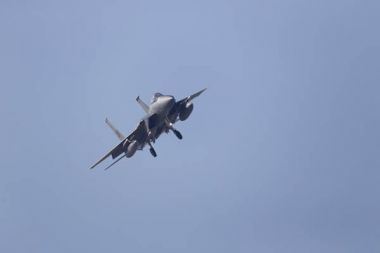U.S.-led coalition shifts focus to moving targets in Iraq and Syria to disrupt ISIS oil smuggling

The U.S.-led coalition against the Islamic State (ISIS) has shifted its strategy in the past months, attacking not just infrastructure and camps but moving targets in Iraq and Syria as well, according to data obtained by the USA Today.
The change in strategy is reportedly an attempt by the allied ground forces to disrupt ISIS from smuggling oil to foreign markets.
The report said these "dynamic targets'' are groups of fighters from ISIS who have been forced into the open desert by allied ground forces.
"When they move now, the coalition has a better sense where they will be moving to and by what routes and stopping points along the way, and it makes eastern Syria a far more target-rich environment," said Nicholas Heras, an expert on Syria and ISIS at the Center for New American Security.
The expert added that U.S.- supported opposition fighters, known as Syrian Democratic Forces, in northern Syria have forced ISIS militants to move to confront the threat.
The paper said the peak in attacking dynamic targets occurred from Nov. 10 to 23 when pilots hit 339 fleeing targets compared with 57 that had been planned before they launched their raids. Also in the same period, U.S.-led pilots destroyed about 400 tankers smuggling oil, a key revenue source for the ISIS.
On Monday, President Barack Obama visited the Pentagon with his national security team for an update on the progress in the campaign against the ISIS, the report said.
Despite the intensification of U.S.-led air raids, an analyst believes the new strategy may only put the coalition's campaign in a "horrible dilemma.''
"ISIS has handed U.S. war fighters a horrible dilemma," said Loren Thompson, a defence industry consultant and military analyst at the Lexington Institute. "They can't hit the terrorists without hitting civilians, too. That's the way ISIS wants it, because hitting civilians could discredit U.S. actions."
Previously, the coalition came out with a directive to avoid targeting the ISIS for fear such losses will alienate local populations and prompt them to side with ISIS.
ISIS producing fake Syrian passports
In a related development, USA Today also disclosed what U.S. intelligence had found out: The terror group has the ability to produce fake Syrian passports.
ISIS has reportedly acquired both a passport-printing machine and blank passport books after seizing Deir ez-Zour, which is home to a passport office, last summer.
Syrians with passports "issued" in these ISIS-controlled cities or who had passport blanks, may have traveled to the U.S., a source told USA Today.
"Fake Syrian passports are so prevalent in Syria that Syrians do not even view possessing them as illegal. They reportedly cost as little as $200,'' the source said.
There are also reported fears that the ISIS is not being blocked from government buildings that house Syrian identification records that could be put to nefarious use, CNN reported. The report's existence was confirmed by a representative for US Immigration and Customs Enforcement.











